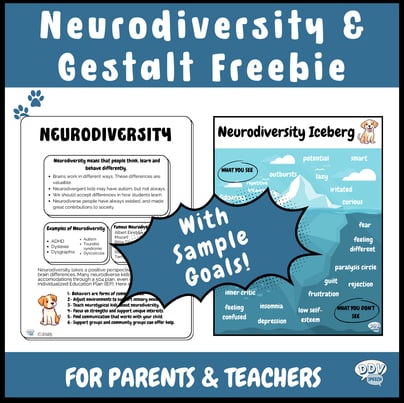April is Autism Acceptance Month: Updated Neurodiversity Norms
Stay up to date with Autism Acceptance preferred terms and symbols as of 2025. Here are the reasons for changes you may have noticed.
NEURODIVERSITY-AFFIRMING PRACTICE
3/30/20253 min read


Neurodiversity norms for April, 2025
April is the month to celebrate Autism around the world. Whether you are an Autistic person, a family member, or professional, you have seen things change. Here is a breakdown of preferred terms as of 2025.
These are norms that have been promoted by Autistic people. In the past, their voices were not included when conducting research or promoting awareness. Full disclosure: I am not Autistic and am open to learning more about preferred terms as they evolve. If you have feedback for me or want to share your perspective for a future post, email me at info@ddvspeech.com.
Neurodivergence recognizes that all brains are wired differently, and develop individually. What are often viewed as “disorders" by neurotypical people, are better viewed as a way of being, understanding, and processing the world.
Neurodivergent that is different, but not less than more conventional ways of learning.
Of course, this is not one unified group where everyone thinks the same way. But here are a few aspects of Autism Acceptance you can help promote that are aligned with the neurodiversity movement.
1. Words Matter: Neurodiversity and Autism
Terms change and so do associations with those names. Neurodiversity and neurodiversity-acceptance are movements that recognize differences in how brains work. Neurodiversity is a broad framework that includes Autism, ADHD, Tourette syndrome, Dyslexia, and Dyscalculia among other labels.
If you are a speech-language pathologist or educator, check out this previous post: 10 Tips for Neurodiversity-Affirming Practice.
Previous terms started from a deficit-model where labels are seen as negative disorders that need to be fixed. In contrast, recognizing someone as neurodivergent, as opposed to neurotypical, shows differences exist without judgement.
Similarly, some members of the Autistic community have promoted the use of Autism (capital A, adjective first) rather than saying “a person with autism spectrum disorder.”
This shift may seem minor, but it takes out the word disorder and acknowledges a cultural perspective. Capitalizing the A in Autism shows it is a community of people who have competence and worth in society.
2. Colors: April 2nd #wearredinstead
Blue is out, red is in. Why? Blue is a color that was selected by non-autistics to promote awareness.
"Light it Up Blue" was a promotion from Autism Speaks, which has been criticized for focusing funding on a cure rather than acceptance, promoting pseudoscience, and other controversial stances.
Red instead was chosen by Autistics to promote acceptance. The #redinstead movement has gained momentum. You can find a full breakdown and more reasons here.
3. Symbols: Puzzle pieces are then, rainbow infinity is now
Puzzle pieces are less preferred, because they are associated with symbols that were selected by non-Autistics. This is similar to the color blue versus red. You can read more here if you want a deeper dive.
Rather than a puzzle piece, use a rainbow infinity symbol to represent all neurodiversity categories (Autism, ADHD, Tourette, etc.). Instead of a “missing piece,” the infinity symbol suggests endless possibilities.
5. Acceptance vs. Awareness
While Autism has been celebrated in April since 1972, names have changed. This article explains the name changes and reasons why. The United Nations (UN) named April 2 as “World Autism Awareness Day.”
The Autism Society of America uses the term “Autism Acceptance Month” to highlight the value Autistic people have in society. This also promotes inclusion in housing, education, and employment rather than just “awareness” of the label.
Conclusion
These 5 areas will help you promote acceptance as neurodiversity-affirming SLP. Keep an eye out as things change and evolve, understanding that the Autistic community is active, productive, and promoting self-advocacy.
Embrace changes and help promote Autism Acceptance this April! Have more questions? DM me on Instagram @DDVSpeech. I would love to connect and support your journey as an SLP.
Download free neurodiversity handouts for your next IEP meeting!
Resources
Join my pack and get started with free neurodiversity-affirming handouts for speech-language pathologists.
contact
Connect
© 2024. All rights reserved.


